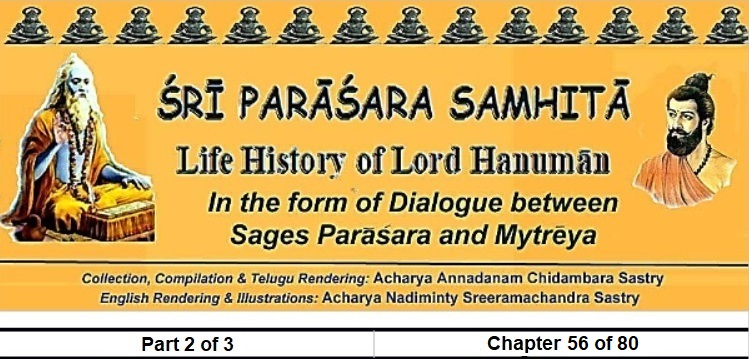
56th Chapter (Şaţpancāśat Paţalah)
“Description of the Impact of Dream Hanumān Mantra”
(Swapana Hanuman Mantra Prabhāvavarņanam)
श्रीपराशरः-
अन्यद्रहस्यं वक्ष्यामि-मैत्रेय शृणु तत्त्वतः
लोकोपकारं गोप्यं च शृण्वतां पुण्यवर्धनम्।। 1
ŚrīParaāśara:
“Oh! Mytreya! I am telling another special feature. Listen carefully. This does well to the world. It has to be kept secret. It increases good merit (puņya). (1)
स्वप्नाख्यहनुमन्मंत्रष्चित्तशुद्धिप्रदो नृणाम्
न देयो भक्तिहीनानांकदाचित्प्राणसङ्कटे।। 2
It is a Hanumanmantra that is dream-based (swapnākhya) and causes purity of thought to people. It should never be told to persons lacking devotion, even if there is danger to life. (2)
मंत्रोद्धारं प्रवक्ष्यामिमंत्रविन्मंत्रसिद्धिदम्
आदौ प्रणवमुच्चार्यदूरदृष्टिपदं वदेत्।। 3
The Mantra
Oh! One well versed in mantras (mantragńya)! I am telling that mantra that gives achievement. Listen. Uttering the cosmic resonance ‘Ōm’ first, then say ‘dooradŗşţi’ (vision for the future), (3)
दूरश्रवणमित्येतदुच्चरेत्तदनंतरम्
समागतानागतेति पदं तु समुदाहरेत्।। 4
Then utter the word ‘dooraśravaņa’ (view for the future). Then say ‘samāgatānāgata’ (came together or not). (4)
वर्तमानेत्यपि पदमुच्चरेदतन्द्रितः
सर्वलोकेतिशब्दं च-वृष्त्तांतेत्यपि संवदेत्।। 5
Then, to be uttered carefully in sequence are the words – ‘vartamāna’ (present), ‘sarvalōka’ (of all the worlds) and ‘vŗttānta’ (affairs). (5)
ततो विज्ञानशब्दं च यथायोगं समुच्चरेत्
हनुमत्पदमुच्चार्य-मह्यं देहीत्युदीरयेत्।। 6
Then say, as the joining aspect (yathāyōga), the wod ‘vigńyana’ (knowledge). Then utter the word ‘Hanuman’ and then ‘mahyamdēhi’ (give me). (6)
वह्निजायां समुच्चार्य-क्रमात्तन्मन्त्रमुद्धरेत्
चत्वारिंशद्वर्णरूपो-मन्त्रराजो महाबलः।। 7
Ultimately, having said ‘swāhā’ (offered to fire) and perform the Swapnāńjanēyamantoddhāra (Mantra of Hanumān of dreams). This is the powerful king of mantras, having a Form of 40 letters (chatvārinśadvarņaroopa). (7)
स्वप्नाख्यहनुमन्मंत्रः-सर्वाभीष्टफलप्रदः
अस्य स्वप्नाख्यमंत्रस्य-ऋषिब्र्रह्मा प्रकीततः।। 8
Features of the Mantra
Swapnāńjanēya mantra fulfills all the desires. Brahma is the ŗşi (seer) for this mantra. (8)
गायत्री छंद इत्याहुः-हनुमान्देवता भवेत्
प्रणवं बीजमित्युक्तं-स्वाहा शक्तिः प्रकीर्तता।। 9
It is well renowned that the meter or rhythm (chandas) for this mantra is Gayatrī; Hanumān is the lord, ‘ōm’ is the seed (beejam), swāhā is the power (śakti). (9)
कीलकं दूरदृष्टिइस्स्यात्-प्रसादे विनियुज्यते
न्यासादि मूलमंत्रेण-कुर्याद्विशुद्धमानसः।। 10
Far-sightedness (dooradŗśţi) becomes the most important thing (by virtue of this mantra). One has to tell the benevolence (prasāda) of the Hanumān in dream as the viniyōga (utilization / application). (10)
ध्यानम्
समागतानागतवर्तमान….
वृष्त्तान्तविज्ञानभरं त्रिलोक्याः
दूरशु्रतिर्दूरगतस्य दर्शनं
स्वप्ने हनूमन्मम देहि नित्यम्।। 11
(Meaning =) Oh! Hanumān! Offer me Your benevolence of always knowing in dreams, the knowledge, farsightedness, distant listening power of the past-present-future of the Three Worlds. (11)
पुरुष्चर्यािवधिस्तस्य-नियतायुतसंख्यया
दशांशं तर्पणं ज्ञेयं-होमस्तस्य दशांशकः।। 12
Mantra Procedure
Repetition of that mantra is decided as 10,000 times. Know that, one tenth (1/10) of it must be offereing water (tarpaņa). Of that one tenth (1/10) must be offering fire sacrifice (hōma). (12)
वेदपारगविप्राणां-तद्दशांशं तु भोजनम्
एवं यः कुरुते विद्वान्-हनुमत्पूजनं सदा।। 13
One tength (1/10) must be apportioned to recitation of the whole Vēda and offering meals to Brāhmin people. That scholar who always performs Hanumān worship in this manner, (13)
स सद्यः सिद्धिमाप्नोति परत्र च परां गतिम्।
पुरष्चर्याविधौ तस्मिन्-समाप्तौ कष्पया हरेः।। 14
Will immediately get the mantra achievement (mantra siddhi). On completion of the mantra repetition (puraścarya) and others, will attain liberation (mukti) by way of the boon of the monkey lord Hanumān. (14)
मन्दवारे महाभक्त्या-प्राथयेत् ब्राह्मणोत्तमान्
त्यक्त्चाहङ्कारदम्भादीन्-पण्डितान् पव्म्चसंख्यया।। 15
On Saturdays one has to worship five best Brāhmins with out any pride or ego. (15)
आव्म्जनेयार्चनागारं-नीत्वा ब्राह्मणपुङ्गवान्
सघृष्तान्पायसापूपान्-विपुलान्गुडमिश्रितान्।। 16
Escorting the Brāhmins into the worship house of Hanumān, big fried rice cakes made of plenty of ghee, jaggery (raw sugar) and milk, (16)
हनुमते निवेद्यादौ-भोजयेत्प्रार्थितद्विजान्
द्विजभुक्तावशेषं च-भुक्त्वा जपपरायणः।। 17
Offering first to Hanumān and thus consecrated ones have to be offered to the invited Brāhmins. Having eaten the left over (by Brahmins), rice cakes with mind on success (jayaparāyaņa), (17)
आचम्य विधिवच्छीघ्रं-जपेदष्टोत्तरं शतम्
आव्म्जनेयपुरोदेशे-ब्रह्मचर्यां समाचरन्।। 18
One has to perform water-sippings (ācamana), followed by recitation of the mantra 108 times as stipulated. Residing in front of Hanumān (idol) and practicing abstinence (brahmacarya) (18)
अधश्शयनसंपन्नः-अप्रमत्तः शनैः स्वपन्
स्वं मनोहरमुद्दिष्य-कामयेत फलं तथा।। 19
Sleeping calmly, but with full alertness on bare floor, one has to wish the result that he desires. (19)
ततो वानररूपेण-बालब्राह्मणवेषतः
अथवा स्वस्वरूपेण-हनुमान् स्वप्नगो भवेत्।। 20
Hanumān in Dreams
Then Lord Hanumān will divinely appear in the dream as a monkey or a Brāhmin boy or as Hanumān Himself. (20)
तस्य वाव्म्छितकार्याणि-विज्ञाप्य प्रहसन् कपिः
दत्वा किव्म्चिदभिज्ञानं-सहसा न्त£हतो भवेत्।। 21
Expressing the desire (of the devotee) and indicating His presence, Hanumān will, (21)
भक्तस्य वानरं रूपं स्वप्नलब्धं भवेद्यदि
तेन श्रेयो भवेच्छीघ्रं-नात्र कार्या विचारणा।। 22
If a devotee sees the lord in a monkey form in the dream, immediately the benevolence of Hanumān will occur. There is no doubt about this. (22)
अभक्तस्य भवेत्स्वप्नः-वानराकारगोचरः
श्रेयांसि तस्य नष्यन्ति-ततः प्रतिकृष्तिर्भवेत्।। 23
If a non-devotee of Hanumān sees the form of a monkey in dreams, no such benefits accrue. Also something undesirable may happen. (23)
अत्रैवोदाहरंतीमं-इतिहासं पुरातनम्
यस्य श्रवणमात्रेण-सर्वपापैः प्रमुच्चते।। 24
The Impact
Examples of these things (Hanumān in dreams) have been told from ancient history. Even by just listening to such things a human is freed from all sins. (24)
अस्ति काशीपुरी धन्या-सर्वपुण्यफलप्रदा
मोक्षलक्ष्मीपताकेव-सर्वलोकेषु विश्रुता।। 25
There is the city of Kāsi that gives all auspicious fruits (results). It is renowned in the world as the very richness of liberation (mōkşalakşmi) from the mundane world. (25)
तत्रास्त्येकादशीमध्ये-केदारेश्वरवाटिका
तस्यास्तु दक्षिणे भागे-रामवाटी विराजते।। 26
There, amidst ēkādaśī (the Eleventh) there is the place (vāţika) of Kēdārēśwara. Located grandly to the south of it is the Rāmavāţi (Place of Rāma). (26)
रामवाट्याः पुरोभागे-गंगा कल्लोलमालिनी
तत्रास्ते जानकीनाथः-साकेत इव मूर्तिमान्।। 27
Right in front of the Rānavāţi, in the River Gangā is Śrīrāmacandra, the husband of Sītā. There was an idol form of Rāma, just like the one in Ayōdhya. (27)
तत्पदाम्भोजवीक्षायां-लब्धतृष्ष्णो निरन्तरम्
हनूमानव्म्जनीसूनुः-भक्तानुग्रहतत्परः।। 28
Always desirous of seeing His lotus feet, Hanumān the son of Ańjana and protector of devotees, (28)
ददाति भक्तलोकस्य-सर्वाभीष्टानि मारुतिः
तत्रास्ते धार्मिको नाम-ब्राह्मणो वेदपारगः।। 29
Fulfills the desires of His devotees. There was a Brāhmin called Dhārmika, who was well-versed in Vēdas. (29)
रामवाटीगुहामध्ये-कष्तवासो निरन्तरम्
तस्य पुत्रो जितामित्रो-धर्मकीर्तिस्तु नामतः।। 30
He always lives in the middle portion of the Rāmavāţi cave. Named Dharnakeerti, his son was capable of winning over enemies. (30)
सदा विनयसम्पन्नो-सदाचारो जितेद्रियः
पितृसेवापरो नित्यं-सौम्यष्षोडशहायनः।। 31
He always possessed good courtesy. He controlled his senses, always used to serve his parents, of a very pleasant nature and was sixteen years old. (31)
सर्वशास्त्रार्थतत्त्वज्ञो-नित्यं वृद्दोपसेवनः
न कदाचिन्महाप्राज्ञो-धर्मकी£तरनामयः।। 32
He knew the meaning and nature of all the sciences (śāstras), always used to serve elders and, that prudent and knowledgeable one and famous as righteous and was always healthy. (32)
तथा च मातापितरौ-साध्वीं जायां स्वकामपि
दुर्भिक्षपीडितानेतान्-पर्यालोक्य पुनःपुनः।। 33
Being as such, he thought about the wretched state of his parents and wife were suffering, and (33)
दारिद्रयंहंतुकामस्स-धनसंग्रहणेच्छया
स्वयमेकचरो विप्रः-दूरदेशान्तरं गतः।। 34
Desirous of getting rid of that pitiable state, he went alone to distant lands, intent on earning money. (34)
अतीत्य दूरमध्वानं-गोकर्णक्षेत्रमाविशत्
दृष्ट्वा तत्र महात्मानं-गोकर्णेश्वरमाविशत्।। 35
Walking a long way, he reached the pilgrim center Gōkarņa. Seeing the great soul Gōkarņēśwara there, (35)
तस्या ध्वश्रमया सद्यः-गोकर्णेहप्रसादतः
विसस्मार स्वकान्बन्धून्-कदाचिद्वासनावशात्।। 36
Immediately, because of the strain of travelling and under the influence of the benevolence of Lord Gōkarņēśwara, he forgot about his near and dear people. (36)
संकीर्तयन्संस्मरयंष्च नित्यम्
सम्पूजयंश्चाप्यभिषेचयन्मुदा
चिरं स्तुवंस्तोत्रभरैरनेकधा
निनाय गोकर्णतले समा बहु।। 37
Always praising the lord of lords, taking his name again and again, happily performing water pouring ritual (abhişēka) to lord Śiva, worshipping him, praising him using many types of invocatory hymns (sookta), he spent many days at that Gōkarņakşētra. (37)
इति निरवधिकं तद्धर्मकीर्तेर्यतात्मनः
तदवृत्तांतमपि ज्ञात्वा-देशदेशांतरेष्वपि।। 38
Fame of Dharmakeerti, who has been performing continuous worship with single minded dedication, spread from place to place to different lands, (38)
बांधवास्सकलास्तस्य-मातापित्रादयस्तथा
दुःखिताः परमं काश्यां-काले काले च सर्वदा।। 39
Plight of his Parents
Pushed into perpetual sadness, his parents and all other relatives, seeing returnees from Kaśi, (39)
अथ यात्रापदेशॅन-नानादेशसमागतान्
ब्राह्मणान् क्षत्रियान्वैश्यान्-शूद्रान्संकीर्णवानपि।। 40
(That are) pilgrims from different lands (including) people of priest class, warring class, trading class, working class, mixed class, (40)
अपृच्छतां कृषा दीनास्तद्वियोगार्तिकातराः
जननी जनकश्चपि-धर्मकीर्तेर्महामतेः।। 41
Emaciated due to the fear of long separation, pathetic but wise parents of Dharmakeerti, (were asking) (41)
अहो धन्या महापुण्याः पान्थाः पुत्रव्रता वराः
किं न दृष्टो भवद्रिस्स-बालो षोडशहायनः।। 42
‘Oh! Auspicious ones! Oh! Great pure ones! Travelers! One best amongst those having sons! Haven’t you seen sixteen year old boy? (42)
पुत्रो स्माकं सदादीनो-धर्मकीर्तिश्च नामतः
सर्वशास्त्रार्थतत्त्वज्ञः-सर्ववेदांतपारगः।। 43
Our son always looks grief besettled. His name is Dharmakeerti, is knowledgeable in understanding of all the sciences (śāstras) and knows all the upanişads (containing esoteric doctrines of Vēdas) fully. (43)
न ब्रूते निष्ठुरं क्वापि-शत्तो वा न्यजनैरपि
एवंविधो महाप्राज्ञो-निष्क्रान्तः काशिकातलात्।। 44
Nowhere dose he talk harshly. He is not resented by even enemies. Such a great scholarly person left the city of Kāśi. (44)
कं देशमाश्रितस्साधुः-स धन्यो देशसत्तमः
एते सर्वे वयं नूनं-निर्भाग्यास्तद्वियोगिनः।। 45
Whichever land that well-behaved man might have reached, would in deed be auspicious. Definitely all of us that lost him are unfortunate. (45)
अतिक्रान्तो बहुःकालः-विना तन्मुखदर्शनम्
कदा द्रक्ष्यामहे पुत्रं-सर्वभूतदयापरम्।। 46
It is a long time since we lost the happiness of seeing his face. God only knows when we can see again our son that is kind to all living beings. (46)
श्रावयिष्यसि वृत्तांतं-को वा पुत्रस्य नश्शुभम्
धर्मकीर्ति यदि प्राज्ञं-न वा द्रक्ष्यामहे वयम्।। 47
Will any one let us hear the auspicious news about our son? If we are unable to see the scholar Dharmakeerti, (47)
नूनं त्यजामहे देहान्-गंगायां पावके पि वा
एवं कष्टवतो बन्धून्-धर्मकीर्तेर्महात्मनः।। 48
We will certainly drown ourselves in River Gangā.’ To the suffering relatives of the great soul Dharmakeerti – (48)
सायंत्रिका जनाः प्रोचुः-न दृष्टो भवतात्मजः
इति गद्गदया वाचा-न शक्ता वक्तुमास्थिताः।। 49
People that came by the evening informed, hardly able to talk because of grief stricken voice, theta ‘they have not seen their child’. (49)
अथान्तरे महाप्राज्ञः-कशिद्ब्राह्मणपुङ्गवः
काश्यामेव कृतावासः-सुतपो नाम वैद्विजः।। 50
Hanumān’s Benevolence
Meanwhile, a great scholar, best amongst Brāhmin people, and dwelling in the city of Kāśi, named Sutapa,(50)
उवाच धामकं विप्रं-वचनं वदतां वरः
अलं विद्वन्विषादेन-निषीद पुरतो मम।। 51
A good interlocutor told so to the religious minded Brāhmin (father of Dharmakeerti). ‘Oh! Scholar! Don’t be sad. Come and sit in front of me. (51)
श्रोतुमर्हसि मद्वाक्यं-माभूत्कालविपर्ययः
स्वप्नाख्यहनुमन्मन्त्रः-प्रसिद्धः जगतां त्रये।। 52
Listen to my words without delay. The Swapnākhya Hanuman mantra is well known in the Three Worlds. (52)
जपन्तस्तं महामन्त्रं-बहवो नियतव्रताः
शुभस्वप्नापदेशेन-कार्यसिद्धिमवाप्नुयुः। 53
Desiring an auspicious dream, many that performed rituals regularly could succeed in their actions by reciting that great mantra. (53)
तस्मात्त्वमपि विप्रेन्द्र-धा£मक प्रियया सह
इमं मन्त्रं गृहाणाशु-मया ते ह्युपदिश्यते।। 54
Hence, Oh! Good Brāhmin! Imbibe the mantra along your wife (dharmapatni); I will teach you the same. (54)
स्वप्नलब्धो हनूमान् सः-पुत्रवार्तां प्रवक्ष्यति
यदि वा द्रक्ष्यसे नूनं-त्वमपि ब्राह्मणोत्तम।। 55
Giving divine appearance in your dreams, Hanumān can give you information regarding your son. Oh! Best of Brāhmins! You too can definitely see your son. (55)
मा कुरुष्वा त्र सन्देहं-सुखितो पि भविष्यसि
इत्युक्त्वा वचनं विप्रं-सुतपो धार्मिकं तथा।। 56
Do not doubt this at all. You will be happy’. So telling to the religious Brāhmin, Sutapa, further, (56)
दिदेश स्वाप्निकं मन्त्रं-सर्वेषां क्षेमदायकम्
सो पि विप्रो जिताहारः-जितक्रोधो जितश्रमः।। 57
Taught-bestowed the safe Dream Hanumān (Swapnākya Hanuman) mantra. Dhārmika (father of Dharmakeerti), who, winning over anger, foregoing food intake and unmindful of the troubles involved, (57)
जजाप परमं मन्त्रमुपदिष्टं महात्मना
रामवाट्यां कृतावासं-त्रिनेत्रं भक्तवत्सलम्।। 58
Recited that best of the mantras taught by that great soul. Resident in the Rāmāvaţi, the very form of Śiva, one kind towards devotees, (58)
राघवाभिमुखवीरं-हनुमन्तं हृदि स्मरन्
पठति स्म महामन्त्रं-पुत्रदर्शनलालसः।। 59
Standing in front of Śrīrāma idol; taking such great warrior Hanumān’s name repeatedly in heart, started reciting that great mantra in his anxiety to see his son. (59)
एवं जपति विप्रेन्द्रे-मंत्रराजं च धार्मिके
बालब्राह्मणरूपेण-मार्तण्डसमतेजसा
स्वप्नलब्धो व्म्जनासूनुः-पुत्रवार्तां न्यवेदयत्।। 60
Hanumān in Dreams
As that righteous Dhārmika recited the mantra in this manner, Lord Hanumān gave divine appearance to him in dreams, with radiance of the Sun and in the form of a Brāhmin child and gave him the news about his son. (60)
आनयिष्यामि पुत्रं ते-प्रेरयित्वा मतिं तथा
उतिष्ठ वत्स! भद्रं ते- न खेदं प्राप्तुमर्हसि।। 61
‘Beloved one! Get up. May good come to you. I can contact your son’s brain and bring him to you. Please do not grieve. (61)
तव पुत्रो महाप्राज्ञो-धर्मकीर्तिरनामयः
गोकर्णनायकस्थाने-निवसन्निर्मलाशयः।। 62
Your son Dharmakeerti, a great knowledgeable person, is hale and healthy, is with a pleasant aim and living in the presence of Gokarņēśwara, (62)
सेवते हर्निशं शम्भोश्चरणाम्बुरुहद्वयम्
सुखेन वर्धते जीवन्-तस्यानुग्रहवैभवात्।। 63
He is worshipping the lotus feet of Lord Śiva day and night. He is living so for some time by His (Śiva’s) benevolance, (63)
अचिरादेष्यति स्वैंरं-धर्मकी£तस्तवात्मजः
इति त्वत्पुत्रवृत्तांतमाख्यातुमहमागतः।। 64
Your son Dharmakeerti will return soon on his own accord. I came to tell you the news about your son. (64)
स्वप्नलब्धमिमं विद्धि-हनूमन्तमिहागतम्
स्वस्ति ते स्तु गमिष्यामि-समागच्छति ते सुतः।। 65
Know me as Hanumān that came here in your dreams. May you be auspicious! I am going. Your son will return.’ (65)
इत्युक्त्वा कपिनाथो पि-क्षणादन्तरधीयत
धार्म्को पि महातेजाः-स्वप्नादुत्थाय वेगतः।। 66
So saying, the great monkey lord divinely disappeared at that very instant. That righteous father Dhārmika awaking from sleep instantly, (66)
कशाहत इवाकस्मा-त्संभ्रान्तहृदयो भवत्
ततः प्रभाते बन्धूनां-रात्रिवृत्तं निवेद्य सः।। 67
Suddenly felt as though struck by a whip and his heart was trembling. Early in the morning he informed friends and relatives about what happened in his deam during the preceding night. (67)
तैर्बहुशाघितो विप्रः-संस्तुवन्कपिनायकम्
प्रतीक्ष्य पुत्रागमनं-तस्थौ ब्राह्मणसत्तमः।। 68
Praised by all of them, that Brāhmin, praising Lord Hanumān, started waiting for his son’s return. (68)
अथान्तरे महादेवो-गोकर्णस्थलनायकः
इयेष प्रेषितं शीघ्रं-धर्मकीर्तिं द्विजात्मजम्।। 69
Meanwhile. Lord of lords (Mahādēva) Gōkarņēśwara decided to send back the Brāhmin’s son Dharmakeerti back. (69)
चित्तशुद्धिप्रभावेन-सेवयोपाधिहीनया
भक्त्या चाव्यभिचारिण्या-धर्मकीर्तितस्तु तारितः।। 70
Because of purity of heart, guileless service, undaunted devotion, Dharmakeerti was made auspicious. (70)
आव्म्जनेयप्रभावेन-समृष्द्धास्सर्वसम्पदः
प्राप्य कैवल्यलक्ष्मीं च-जगाम स्वपुरं ततः।। 71
He was bestowed with all riches by the benevolance of Hanumān. Having obtained the Mōkşalakşmi (the fortune of liberation from attachments) Dharnakeerti reached his native place. (71)
श्रीपराशरः
स्वप्नाख्यहनुमन्मन्त्रप्रसादाद्धार्मिको द्विजः
प्रोषितं सुचिरं कालं-पुत्रं प्राप्य पुनस्स्वतः।। 72
ŚrīParāśsra:
By virtue of the impact of the Swapnānjanēya mantra, Dhārmika got back his son who lived in far off land for a long time. (72)
भुक्त्वा यथेप्सितान्भोगानन्ते मोक्षमुपागतः
इति तन्मन्त्रमाहाम्यं-गदितं विस्तरेण ते।। 73
He enjoyed all the desires that he wishes and ultimately attained liberation. Thus how I explained you, Oh! Mytrēya! The greatness of the Swapnākhya Hanuman mantra. (73)
गोपनीयं प्रयत्नेन मयि शृण्वतस्तद्वशः।। 74
Please keep this Hanuman mantra that I told as a secret on purpose. (74)
अद्यपि काशीपुररामवाट्यां-जपप्रणामस्तुतिकृज्जनस्य
भव्यं च भूतं च भविष्यदेवं निवेदयेत्स्वप्नगतो हनूमान्।। 75
Even now, for those that perform recitation, worship and singing praises at Rāmāvaţi in Kāśi, Lord Hanumān appears in dreams and tells about the past present and the future. (75)
![]()
इति श्रीपराशरसंहितायां श्रीपराशरमैत्रेयसंवादे स्वप्नहनुमन्मन्त्रप्रभाववर्णनं नाम षट्पव्म्चाशत्पटलः
Thus ends the 56th Chapter “Description of the Impact of Dream Hanumān Mantra”

Click here to visit the Contents of the Part 2.
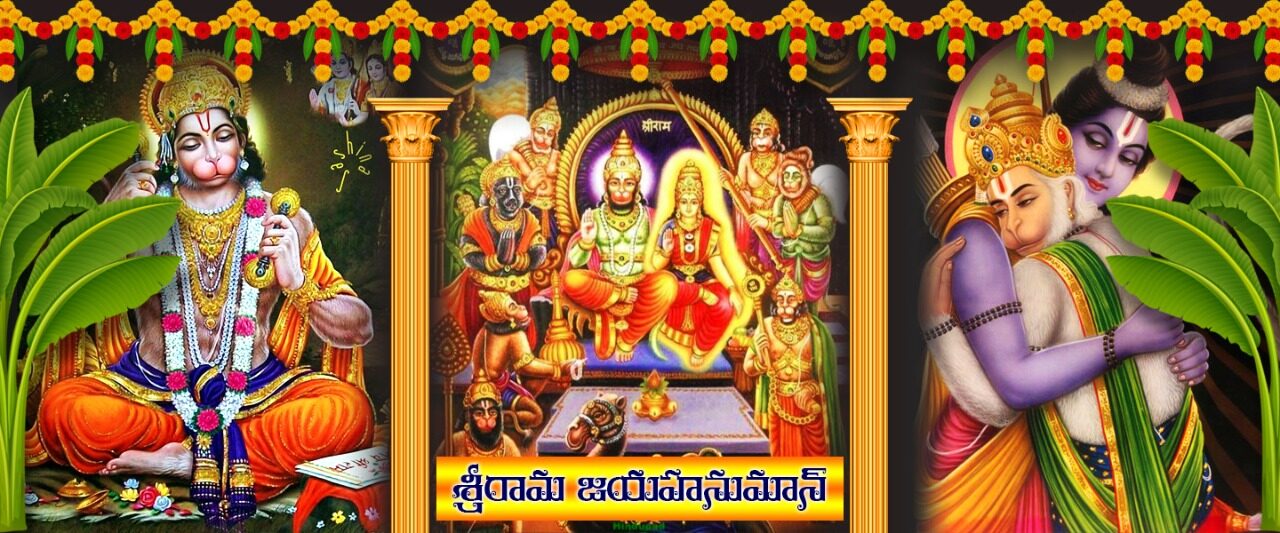
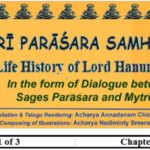

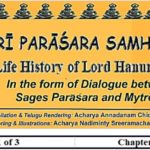
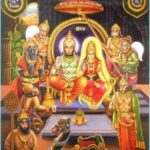


Be First to Comment